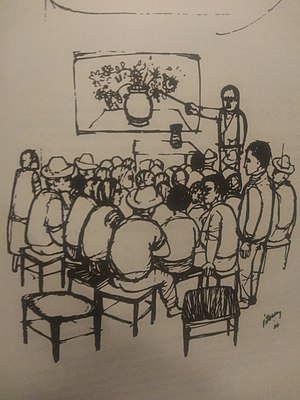
Critical pedagogy is a concept proposed by Paulo Freire in his book Pedagogy of the Oppressed which explores participation and empowerment of oppressed groups in society.
Pedagogy of the Oppressed[edit | edit source]
Pedagogy of the Oppressed (Portuguese: Pedagogia do Oprimido) is a book by Brazilian educator Paulo Freire, written in Portuguese between 1967 and 1968, but published first in Spanish in 1968. An English translation was published in 1970, with the Portuguese original being published in 1972 in Portugal, and then again in Brazil in 1974. The book is considered one of the foundational texts of critical pedagogy, and proposes a pedagogy with a new relationship between teacher, student, and society.
Dedicated to the oppressed and based on his own experience helping Brazilian adults to read and write, Freire includes a detailed Marxist class analysis in his exploration of the relationship between the colonizer and the colonized. In the book, Freire calls traditional pedagogy the "banking model of education" because it treats the student as an empty vessel to be filled with knowledge, like a piggy bank. He argues that pedagogy should instead treat the learner as a co-creator of knowledge.
As of 2000, the book had sold over 750,000 copies worldwide.: 9 It is the third most cited book in social science.
(Cultural circles) Círculo de cultura[edit | edit source]
Culture circles were classrooms developed by Brazilian educator Paulo Freire for adult literacy, especially for agricultural laborers. Freire took part in these classrooms during the 1960s, previous to the military coup, and later in Chile while in exile. He chose this name for his classrooms for the following reasons:
- To avoid using the term "literacy classrooms," a term that may be deemed derogatory and more related to what Freire described as a banking educational model.
- Beyond learning to read and write, culture circles seek to develop critical consciousness through cooperative research.